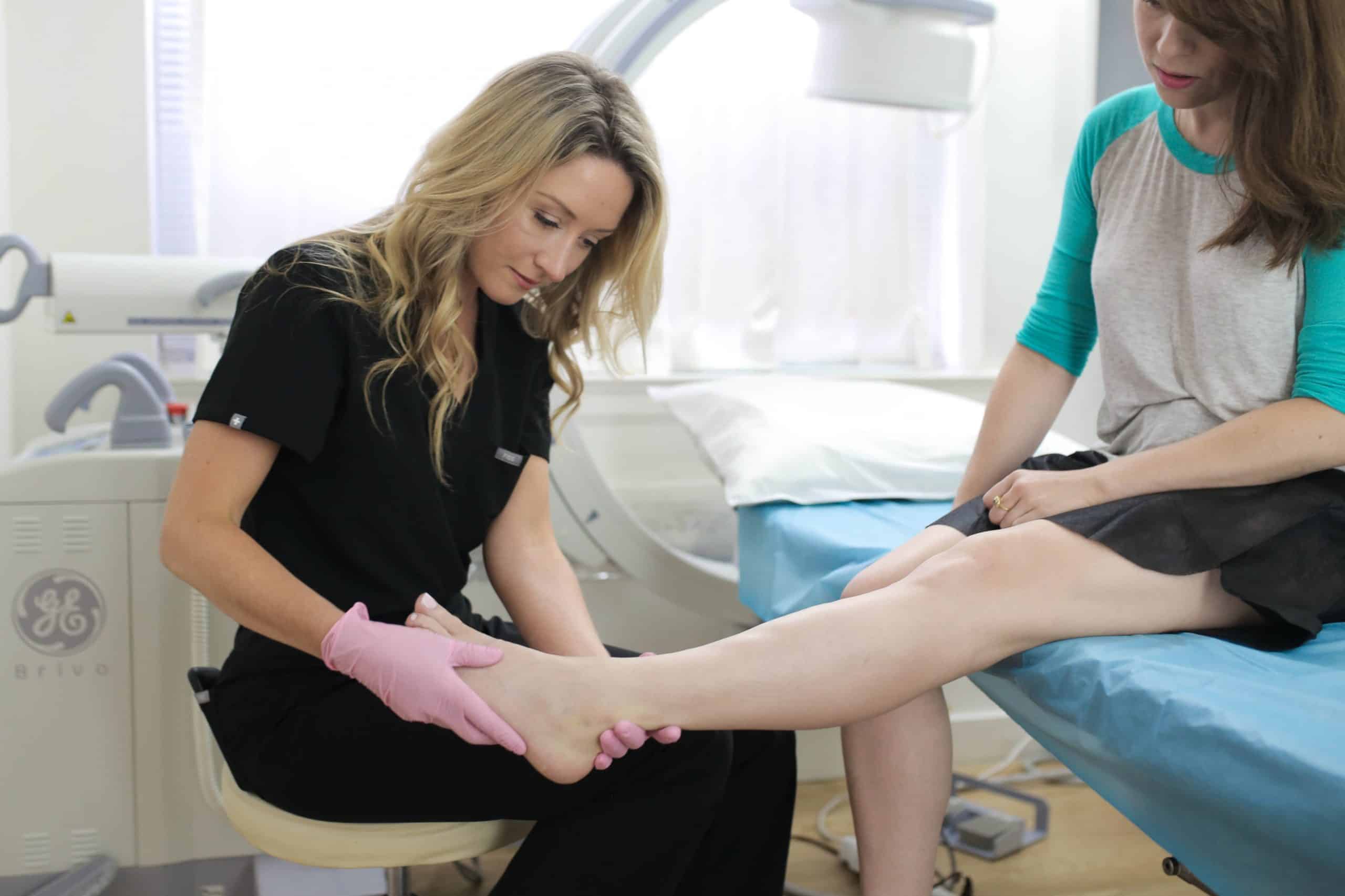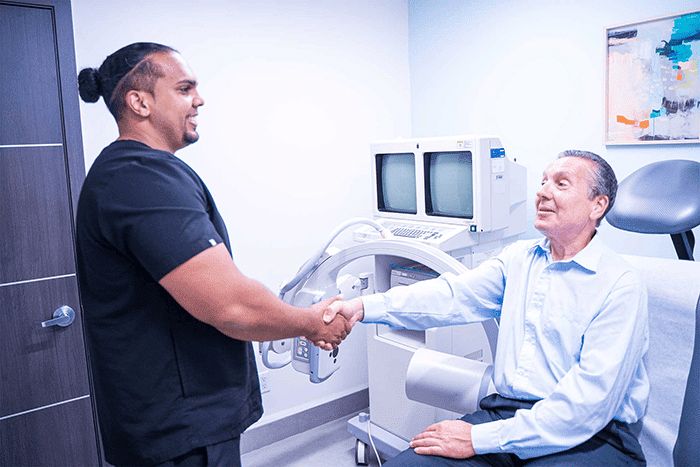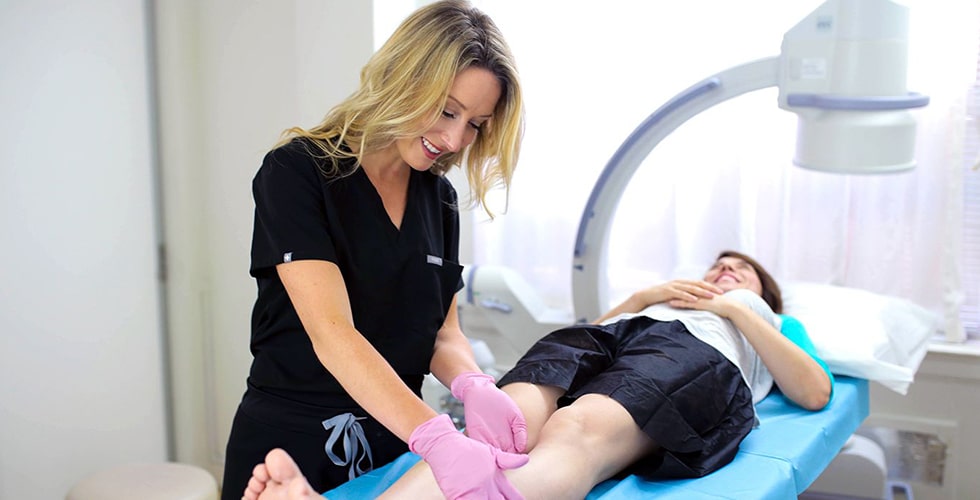If you have blue or purple veins in your legs, then it is the right time to visit a doctor who treats vein disease. These purple, greenish, and blue veins are called varicose veins. They usually appear in your legs, ankles, or feet. Treatment is necessary as they can often lead to severe health issues. However, it is also important to find the best vein doctor who treats vein diseases. In this article, you will learn about What Kind of Doctor Treats Varicose Veins and how to find a vein doctor for varicose veins.
What Are Varicose Veins?
Varicose veins are enlarged blood vessels that are swollen and bulge just under your skin.
These veins can be painful and itchy sometimes. Some people have varicose veins, and some have spider veins; the difference is that spider veins are smaller and red and purple in color, and varicose veins are large veins with purple or greenish colors. Varicose veins look ugly and can be dangerous to your health. These veins form blood clots in the legs, usually seen in people who are overweight. It can stop the flow of blood, causing health issues. Minor cases of varicose veins can be treated at home, but major signs of varicose veins may not be treated at home; you need to visit a vein specialist. Thinking about what kind of doctor is a vein specialist? Here it is.

What Kind of Doctor is a Vein Specialist?
"Vein specialist or a phlebologist is a term that deals with all vascular health problems. There are many vein doctors available, but you need to find the best board-certified and fellowship-trained vein specialists who play in the field perfectly. A vein doctor has specialized training in the latest minimally invasive varicose vein treatments, and then they perform at the vein treatment center.
The doctor first evaluates the signs of varicose veins using their machines and tools. A test will be taken to check the root cause of varicose veins. With a proper test and diagnosis, you can achieve long-lasting results.
For many people, varicose veins may not be dangerous in some cases, but for many, it can cause death. So, treatment is necessary to avoid any health risks. If you have a more severe issue, your vein physician may treat it with injections, laser therapy, or surgery.
Where do Varicose Veins Usually Appear?
Varicose veins usually occur in the lower part of the body, including the feet, ankles, legs, or sometimes the thighs. Varicose veins are usually common in women, especially during pregnancy.
Treatment is necessary. Consult with your doctor if you see any signs of varicose veins.

Can Varicose Veins Go Without Surgery?
Sometimes, varicose veins may go without a need for surgical treatment, but usually, they need treatment to vanish completely. Now, varicose vein treatment is minimally invasive compared to earlier treatments. Earlier, surgical treatments like vein stripping, vein ligation, and venous bypass surgery were used to treat vein problems. Also, they have a higher risk compared to today’s treatment options for the vein treatment specialist.
Today, the treatments used are nonsurgical and minimally invasive, such as radiofrequency ablation, endovenous laser ablation, ClariVein, and VenaSeal. These are performed under local anesthesia, and they are safe and involve only an injection or a small incision.
Also, with these latest treatment options, you can now go back to daily activities immediately.
In Conclusion:
Varicose veins can be dangerous if left untreated; they can spread to larger veins, bulging just underneath your skin if not treated. They can cause more blood accumulation, causing more pain and increasing health risks. Veins, with time and no treatment, can cause leg ulcers that do not heal. So, talk to a doctor immediately about vein treatment near me if you have varicose veins in your legs, ankles, or feet.
Most people choose to overlook the appearance of varicose veins in their lower limbs. The visible swollen and twisted veins that tend to appear on your legs create discomfort during shorts use. There exists medical treatment for dealing with varicose veins, which does not require you to live with them. Public healthcare facilities employ actual vein treatment doctors who offer assistance, while medical insurance might provide coverage.
What Do Vein Centers Do?
The Centers for Vein Treatment in New Jersey operates as one of many specialized vein centers that specialize in treating both spider veins and varicose veins. These aren't just cosmetic clinics. The clinics provide facial benefits for leg appearances; however, they prioritize patient health above all else. Neglecting varicose veins may lead to painful legs, accompanied by swelling and heaviness, and the potential development of ulcers on the skin.

The medical staff at these vascular centers executes ultrasound testing, which provides information about your vein functionality. After performing examinations, specialists provide laser treatment or injectable substances, or perform minimal surgical procedures to close and eliminate defective veins. The goal? These facilities exist to improve your health while achieving a better appearance and treating your legs appropriately.
Are Varicose Veins Covered by Insurance?
The insurance coverage depends on specific factors that need to be met.
● Medical problems related to vein issues, consisting of pain along with swelling and skin alterations, determine your eligibility for insurance coverage of treatment.
● Remote vein treatments are likely to receive insurance coverage when your doctor determines they serve medical purposes other than cosmetic needs.
● Your choice to take compression stockings and other basic treatment options comes before seeking insurance-covered varicose vein treatments.
The majority of vein treatment providers and vein centers help patients determine their insurance benefits. Medical personnel at vein clinics regularly work with insurance matters which enables them to reach out directly to your healthcare provider for pre-approval decisions.

If your legs experience heavy, worn-out, or achy all the time, mainly after standing, or if you see veins coming out, it’s a very good time to check in with a vascular physician. Other symptoms to search for include:
● Skin discoloration around your ankles
● Swollen legs or ankles
● Itchy or dry skin near the veins
● Leg cramps or burning sensations
The longer you wait, the worse these signs can get. And hello, although it is only for appearances, it's nevertheless well worth asking about.
Why Choose Centers for Vein Treatment in New Jersey?
If you’re within the Garden State, there are top-rated Centers for Vein Treatment in New Jersey that provide today's care. These places are staffed by skilled vein treatment doctors who recognise exactly what to do and work with all the big coverage agencies. Plus, they commonly offer free vein evaluations, so you can see what’s happening totally free prematurely. The choice is yours, and you can make the right decision for your health so that your veins can feel happy and do not create any major problems.
Dealing with varicose veins? You’re not alone. The bulging, twisty veins that commonly appear on legs create true discomfort throughout the body and during appearances. The good news? Medical interventions exist to provide treatment for both spider and varicose veins, which will enhance your well-being and appearance. The basic information about vein treatments will be presented to readers who search online for specialists.
First Things First: What Are Varicose Veins?
Poorly functioning valves in your veins create conditions for blood to accumulate inside veins, which leads to the development of varicose veins. The accumulated blood creates swollen and twisted veins that might also produce painful sensations. The veins classified as spider veins remain smaller than varicose veins, with their appearance as thin red or purple lines, which normally appear either on your face or legs.

What Kind of Doctor Treats Varicose Veins?
A visit with a vein treatment specialist or a phlebologist is required to find proper treatment. Sometimes, vascular surgeons or dermatologists with special training in vein care handle these cases, too. These specialists possess advanced skills to identify and handle both mild spider veins and severe varicose veins and other vein problems.
The cost of treatment varies according to which option patients choose. Medical procedures and their required sessions determine the overall treatment expenses. Basic sclerotherapy, which treats spider veins, becomes an affordable option, yet vein-stripping surgeries, along with laser treatment,s tend to be more costly. Now, the big question is—is it covered by insurance? Medical insurance will cover varicose vein treatments whenever these veins cause health-related symptoms like discomfort or swelling. Your insurance will not cover the expenses for cosmetic vein procedures only.

Types of Vein Treatments You Should Know
There’s no one-size-fits-all solution. Here are a few popular vein treatments for spider and varicose veins:
● Sclerotherapy: A solution is injected into the veins, causing them to shrink and fade.
● Laser Therapy: Strong bursts of light make veins slowly disappear.
● Radiofrequency or Laser Ablation: Heat is used to close off larger varicose veins.
● Vein Stripping or Surgery: This is less common now but still used for very large veins.
● Your vein treatment specialist will help you decide what’s best for your specific situation.
Looking for Vein Treatment in New Jersey?
If you’re hunting for vein treatment in New Jersey, you’re in luck. The state has many top-rated clinics and doctors who specialize in treating varicose and spider veins. Just make sure the clinic is accredited and the doctors are board-certified. Read reviews, check before-and-after photos, and don’t be afraid to ask questions during your consultation.
Final Thoughts
Taking care of varicose or spider veins isn’t just about looks; it’s about feeling good and staying healthy. With today’s technology, treatments are easier, faster, and way less scary than they used to be. So don’t put it off. Whether you’re just curious or ready to book an appointment, knowing what to expect, from what kind of doctor treats varicose veins to how much varicose vein treatment costs, can help you make the right decision.


